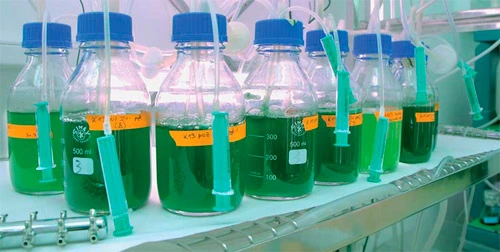Over the pond
“Whoever invents and produces a new kind of Spreewald gherkin does not have to go to America, but can stay on the regional market,” explained Prof. Dr. Dietmar Lerche. He himself sells four out of five devices abroad. Fifteen years ago he founded the company L.U.M. GmbH that develops new kinds of measuring methods and equipment, e.g. for the storage stability of paints, foodstuffs, and cosmetic products.
Lerche is pleased: In the meantime his equipment has become the laboratory standard at a number of international groups. In other words it is used everywhere these groups develop and produce – distributed all over the world.
In the beginning, as far back as the founding phase, Lerche had his eye above all on the German market for laboratory medicine. However he confessed that this market is simply too small: he can sell only ten to fifteen units of the highly specialised device, the LUMi-Sizer, in the whole of Germany. In 2004 L.U.M. even founded a subsidiary in the USA. “That’s a giant step for such as small company,” confessed Lerche, who employs twenty workers in Germany, and explained that international success first needs a convincing demonstration of a good product.
A tempting offer from America also marked the birth of Cyano Biofuels GmbH: “In Berlin there has been decades of research concentrating on cyanobacteria, or blue green algae,” explained the biochemist Dan Kramer. Such a concentration of competence recently drew the attention of a US firm that as early as the 1980s was granted a patent for the manufacture of bioethanol through the action of cyanobacteria. Now, in times of dwindling fuel resources, the firm was seeking a partner who could also realise this new kind of technology: Together with a colleague Dan Kramer founded the spinoff Cyano Biofuels from the Biology Institute of Humboldt University.
Since then they are investigating how this alternative fuel can be produced differently than to date: “We don’t want to utilise cyanobacteria as a biomass for extracting ethanol, instead we are interested in direct bioethanol synthesis,” explained Kramer. Cyanobacteria produce ethanol as a natural metabolic product, however only in very small quantities. His company therefore researches into the optimisation of this bacterial metabolism for greater ethanol yield.
An international alignment is therefore necessary for quite practical reasons as well. “We need partners in other countries who can provide us with large areas that cannot be used for agriculture,” explained Dan Kramer: wasteland with the greatest possible solar irradiation, a connection to seawater and optimally a coal fired power plant nearby. After all, the cultivation of cyanobacteria does not need much more than sunlight, salt water and carbon dioxide. Initial small trial areas for photobioreactors have already been set up in Florida and the south of Spain, and a large scale production plant is currently being prepared with an industrial partner – in Mexico.
